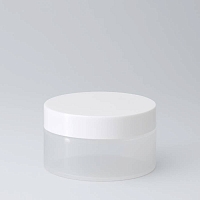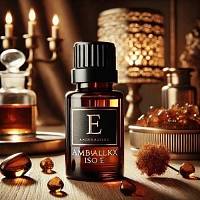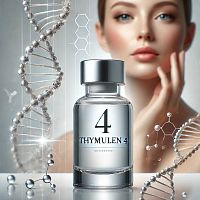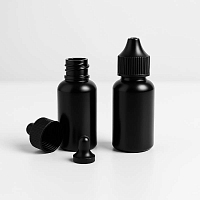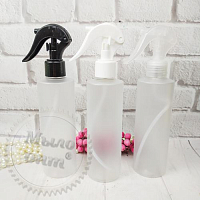-
 Absolutes
Absolutes
-
 Active Complexes
Active Complexes
-
 Actives and Peptides for Cosmetics
Actives and Peptides for Cosmetics
-
 Amino Acids
Amino Acids
-
 Food Flavorings
Food Flavorings
-
 Ayurveda
Ayurveda
-
 Vitamins
Vitamins
-
 Gelling Agents and Thickeners
Gelling Agents and Thickeners
-
 Hydrosols and Floral Waters
Hydrosols and Floral Waters
-
 Hydrolyzed Proteins
Hydrolyzed Proteins
-
 Fragrant and aromatic substances
Fragrant and aromatic substances
-
 Acids, Salts, Alcohols, and Alkalis
Acids, Salts, Alcohols, and Alkalis
-
 Preservatives and Antioxidants
Preservatives and Antioxidants
-
 Cosmetic Raw Materials
Cosmetic Raw Materials
-
 Dyes, Pearlescents, and Glitters
Dyes, Pearlescents, and Glitters
-
 Face Masks, Scrubs, and Dried Flowers
Face Masks, Scrubs, and Dried Flowers
-
 Natural Base Oils for Cosmetics
Natural Base Oils for Cosmetics
-
 Candle Supplies
Candle Supplies
-
 Melt and Pour Soap Bases
Melt and Pour Soap Bases
-
 Base for cosmetics, cream, serum, shampoo
Base for cosmetics, cream, serum, shampoo
-
 Fragrance Oils
Fragrance Oils
-
 Surfactants
Surfactants
-
 Peelings for Skin
Peelings for Skin
-
 Herbal Powders and Plant
Herbal Powders and Plant
-
 Silicones and Conditioning Surfactants for Hair
Silicones and Conditioning Surfactants for Hair
-
 Raw materials for dietary supplements
Raw materials for dietary supplements
-
 Packaging for Cosmetics and Perfumes
Packaging for Cosmetics and Perfumes
-
 Molds, Packaging, Tools
Molds, Packaging, Tools
-
 Organic Extracts
Organic Extracts
-
 Emollients for Cosmetics
Emollients for Cosmetics
-
 Emulsifiers
Emulsifiers
-
 Essential Oils
Essential Oils
Tryptophan: A Natural Beauty Booster
Tryptophan, an essential amino acid found in various foods, has been gaining attention for its potential benefits in cosmetics. This versatile ingredient offers a range of advantages for skin health and overall well-being.
The Role of Tryptophan in Cosmetics
-
Serotonin Production: Tryptophan is a precursor to serotonin, a neurotransmitter that plays a crucial role in mood regulation, sleep, and appetite. By increasing serotonin levels, topical tryptophan can help:
- Reduce stress and anxiety: Serotonin is often associated with feelings of happiness and contentment.
- Improve sleep quality: Serotonin is involved in the regulation of sleep-wake cycles.
- Enhance mood: A balanced serotonin level can contribute to a positive outlook.
-
Melatonin Synthesis: Tryptophan is also a precursor to melatonin, a hormone that regulates sleep-wake cycles. Incorporating tryptophan into skincare products can potentially:
- Promote restful sleep: Melatonin helps induce sleepiness and improve sleep quality.
- Reduce the effects of jet lag: Melatonin can help regulate sleep patterns during travel.
-
Anti-Aging Properties: Tryptophan may have anti-aging benefits by:
- Reducing oxidative stress: Serotonin and melatonin have antioxidant properties that can protect the skin from damage caused by free radicals.
- Promoting collagen synthesis: Tryptophan may indirectly support collagen production, a protein essential for skin elasticity and firmness.
Application Options and Areas of Use
Tryptophan can be incorporated into a variety of cosmetic products, including:
- Serums and moisturizers: These products can deliver tryptophan directly to the skin, promoting hydration and improving skin texture.
- Night creams: Tryptophan's role in melatonin production makes it a suitable ingredient for night creams designed to enhance sleep and rejuvenate the skin.
- Hair care products: Tryptophan may help improve scalp health and promote hair growth by supporting cellular function.
- Makeup products: Some makeup products, such as foundations and concealers, may contain tryptophan to enhance skin health and provide a more radiant complexion.
Cosmetic Recipe: Tryptophan-Infused Night Serum
Ingredients:
- 1 ounce aloe vera gel
- 1 teaspoon jojoba oil
- 1/4 teaspoon tryptophan powder
- 5 drops lavender essential oil
Instructions:
- In a small bowl, combine the aloe vera gel, jojoba oil, and tryptophan powder.
- Stir well until the ingredients are thoroughly mixed.
- Add the lavender essential oil and stir gently.
- Pour the serum into a clean dropper bottle.
- Apply a few drops to your face at night before bed, massaging gently into your skin.
Note: Always patch test new products before applying them to your entire face. If you have any allergies or sensitivities, consult with a dermatologist.
By incorporating tryptophan into your skincare routine, you can harness the power of this amino acid to enhance your skin's health, promote relaxation, and improve overall well-being.
| INCI | Tryptophan | |
| pH | 5.0-7.0 | |
| Other | ||
| Application | Anti-aging cosmetics: Tryptophan is used in creams and serums to improve skin elasticity and combat wrinkles. Skin care products: Included in moisturizers, lotions, and face masks due to its ability to retain moisture and protect the skin. Products for sensitive skin: Added to products to relieve irritation and combat inflammation. Decorative cosmetics: Used in foundations and powders to protect the skin and prevent irritation. | |
| Att brand | USA | |
| Color product | white or slightly cream | |
| Dosage | Cosmetics: 0.5–2% in creams, serums and lotions Dietary supplements: 250–500 mg depending on the intended use Food: up to 3 g per day (as a dietary supplement) | |
| Features | All information presented on the site is for reference only | |
| Minimum count | 1 | |
| Name | Tryptophan, 100 g | |
| Packaging | container for transportation | |
| Packing | 100 g | |
| Properties | Antioxidant properties: Tryptophan helps fight oxidative stress, protecting the skin from harmful environmental influences. Hydration and protection: Tryptophan retains moisture in the skin, prevents it from drying out, and also helps strengthen the skin barrier. Anti-inflammatory properties: It reduces inflammation and soothes the skin, which makes it useful in products for sensitive and problematic skin. Anti-aging action: Tryptophan promotes skin cell renewal and improves its texture, which makes it popular in anti-aging cosmetics. | |
| Purpose | Tryptophan is an important component that is widely used in cosmetics for its anti-aging, moisturizing and restorative properties, as well as a dietary supplement to maintain health and improve mood. Tryptophan is an amino acid that plays an important role in a number of biochemical processes, including the synthesis of serotonin and melatonin, making it an important component for a variety of applications, including cosmetics. Skin cell regeneration Skin hydration and protection Improvement of skin texture and elasticity Soothing of inflamed skin | |
| Solubility | in the water | |
| View | powder | |
| Valid until | 09.2026 | |









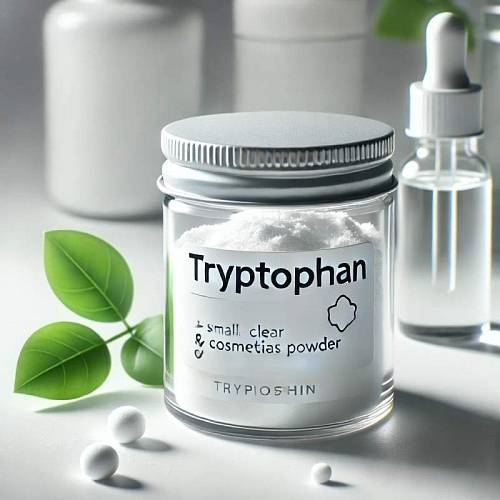
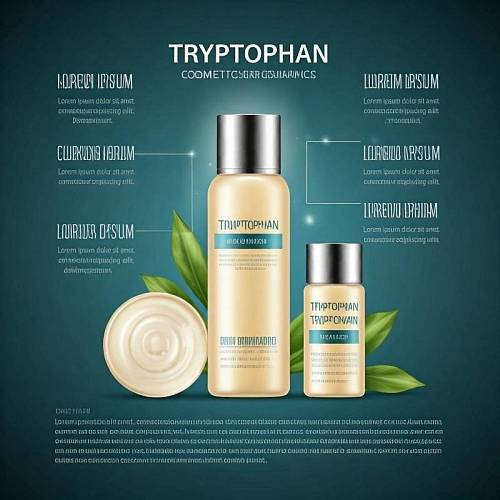


 Add to cart
Add to cart Buy in 1 click
Buy in 1 click

 Add a review
Add a review To favorites
To favorites To compare
To compare






